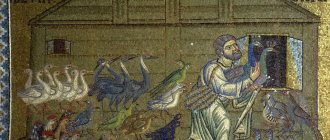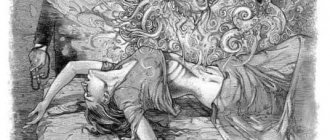Author of the material:
Inna Trofimova
writer, psychologist, gestalt therapist
The word “sect” refers to those negatively connoted words that make you feel uneasy. But according to researchers of modern sectarianism, any person can succumb to the influence of dangerous teachings. Forewarned is forearmed. We talk about different directions and classifications of the sectarian movement, manipulation schemes and signs by which one can recognize a destructive teaching at the recruitment stage.
What is a sect and why is it dangerous?
As already noted, a sect is a group of people who have separated from some creed and are opposed to it.
The first danger of a sect is that if one of the family members has joined it, the leaders of the sect will make every effort to separate the person from his family and deprive him of his property. And in such situations, most people make a choice that is far from being in favor of their family.
Another danger of sects is the brainwashing of children, because many adults join sects together with their children. If a child encounters the beliefs of “spiritual mentors” throughout childhood, then their life goal will only be to please the mentors.
Another danger of sects is considered to be distance from public life. If a person somehow manages to leave the sect, then he simply will not be able to adapt to real life and there is a high probability of suicide.
Stundism
(Russian-Ukrainian, South Russian), stunda (from German Stunde - hour, meaning: for reading and interpreting the Bible). - a Christian religious movement that became widespread in the 19th century, first in the southern (Kherson, Ekaterinoslav, Kyiv) provinces, and then in other regions of the Russian Empire.
In documents and literature, the movement is sometimes called Stundobaptism. In accusatory, so-called “anti-sectarian” literature, in journalism and in official record keeping of the late 19th and early 20th centuries, the term “Stundists” was sometimes used broadly - to Russian Baptists and Evangelical Christians-Pashkovites.
The movement appeared after the publication of the books of the Bible in the new Russian synodal translation and manifested itself in the form of circles spontaneously arising among the peasantry for the reading and interpretation of the Holy Scriptures. The views of the Stundists were influenced by German Protestant colonists who lived in the southern provinces. Participants in the movement were harassed and criticized. At the end of the 19th century, Russian-Ukrainian Stundists mainly joined the Union of Russian Baptists.
Stundism was expressed in the massive and spontaneous emergence of Bible study circles among the peasantry. A pietistic movement such as Stundism was characterized by an emphasis on personal piety. Russian-Ukrainian Stundists adhered to moral standards that had exceptional argumentative power. Including a complete cessation of drinking alcohol. A sober lifestyle and the associated increase in prosperity are often mentioned in the collection of documents of Bishop Alexy (Dorodnitsyn) as the reason for the transition to a new faith.
Types of sects
Today there are several types of sects:
- Totalitarian. A closed group whose leader has unquestioned authority. Members of the sect are strictly prohibited from contacting the outside world and their loved ones. At the slightest disobedience, a person receives serious punishment, even death.
- Satanic. An organization built on cruelty, preaching the cult of Evil. Only complete callousness and lack of pity are encouraged. Such groups arise among young people, they visit cemeteries and carry out ritual killings.
- Occult. The organization's teachings are based on a belief in fantastic elements. The leader of the group notes that the world will soon perish, and only he has an idea of how to escape. Members of the organization conduct seances of spiritualism, disturbing the souls of the dead.
- Sectarian organizations where sexual relations are encouraged. Participants in such organizations constantly pray, gradually entering a trance, resulting in a dulling of consciousness. After the “teacher’s” call to make love, there is no resistance at all. Orgies are a characteristic feature of such organizations.
Baptistism
(from ancient Greek βάπτισμα: baptism; from βαπτίζω - “immersed in water”) - one of the directions of Protestant Christianity.
A denomination that emerged from among the radical English Puritans. The basis of the Baptist doctrine, which gave its name to the entire movement, is the principle of voluntary and conscious baptism by faith of adults with strong Christian convictions and renunciation of a sinful lifestyle. Infant baptism is rejected as inconsistent with the requirements of voluntariness, conscience and faith. Like other Protestants, Baptists recognize the Bible, consisting of 66 books of the Old and New Testaments, as Holy Scripture, which has exclusive authority in everyday and religious life.
In the practice of church life, Baptists adhere to the principle of universal priesthood, as well as the independence and independence of each individual church community (congregationalism). The presbyter (pastor) of the community does not have absolute power; the most important issues are resolved at church councils, fraternal councils and general meetings of believers.
Are Baptists sectarians or not?
Baptists are a Protestant sect. The organization is widespread throughout the world, in particular in Russia and Ukraine.
They refuse such basic sacraments of the church as communion and baptism. Baptism is performed in adulthood, and they call priests presbyters.
Members of the organization do not accept the cross and prayer in front of the icon, and do not believe in the Mother of God and the saints. The Bible is considered a holy book, but it has a different interpretation than that of Christians.
Ardent opponents of alcoholic beverages, they are even forbidden to sit at the same table with people who drink alcohol.
"Neo-Pentecostals"
The list of sects in Russia should be continued with a story about an organization that is currently considered the largest in the country. This is the sect of “Neo-Pentecostals”, or, as they are also called, “Charismatics”. According to some reports, it has about 300,000 adherents in our country, which is almost half of all sectarians in Russia. This organization originated in America in the seventies of the 20th century. They rent concert halls and stadiums for their meetings. Everything is carried out in the form of a well-staged show in a purely American manner.
Signs of a sect: psychology
The characteristic features of the sect are the following:
- Marketing - The leaders of the organization are trying to attract more participants, so the group members actively attract new people.
- Ranks and double teaching - when joining a sect, a person receives only superficial knowledge, but as he moves up the hierarchy, he is told new information that differs from the primary one.
- Contributions - in most sects, a “tithe” is collected from a person’s income, and it is from these contributions that the organization develops.
- Presence of a leader - every organization has its own leader, about whom only information is known that confirms his “sacredness.”
- Suppression of rational thinking - information is presented to a cult member in such a way that he does not have the opportunity to think about it.
Reasons for the growth of sectarianism in recent years
Religious sects in Russia have received a powerful impetus for their development over the past two decades. An important role here was played by the deterioration of the economic situation of a number of segments of the population and the political instability of recent years. Apologists of various sectarian movements, using these internal difficulties, try to exploit them, attracting new members to their ranks. Converted members of such sects who believe the propaganda promises come under severe psychological pressure. Often the result of their gullibility is severe mental illness, loss of property, and separation from family.
Mental violence against a person
Damage to the health and personality of a person in a cult is caused as a result of hidden mental violence and manipulation of a person’s consciousness under the guise of sermons, ceremonies, rituals, as a result of massive suggestions in states of artificially altered consciousness, up to deep hypnosis and self-hypnosis, resulting from the use of certain psychotechnical methods during “ services”, rituals, initiations, meditations.
Specialists and doctors who observed, for example, former Scientologists, diagnosed their condition as “post-traumatic stress disorder.” Psychiatrists came to believe that Hubbard had inverted the treatment processes used to relieve obsessive-compulsive disorders, thereby artificially driving clients into syndromes of these conditions, which in turn led to a range of mental disorders. Former members reported a high rate of mental illness caused by so-called "chronic fatigue syndrome" - a lack of desire and energy. However, so far no in-depth scientific research has been carried out on these reports, says F.V. Kondratiev.
Psychosomatic symptoms (headaches, back pain, asthma, skin disorders, sleep disorders, nightmares, digestive disorders, sexual problems) become constant companions of former adherents of totalitarian cults and sects.
Problems with decision making, delayed psychological development, loss of psychological strength, guilt, fear, loss of trust, fear of intimacy and commitment. There are facts indicating that many made desperate attempts to regain freedom, but fears and persecution from the cult embedded in the subconscious drove people to mental disorders and even suicide.
“Sinton” by Nikolai Kozlov:
- About Nikolai Kozlov
- The truth of information business - What is “Synton” by Nikolai Kozlov?
- Cathedral of blessings. Prince Alexander Nevsky - Antipsychology
- Alexey Ivakin - Unformatted destructive sects
- Fontanka.Ru - Cruel games "Sinton
" - Natalia Dmitrieva - Training “Flight” - harmful magic under the guise of psychology
- Boris Volkhonsky - For me, Nikolai Kozlov is the scolder about whom the Apostle Peter wrote
(answer to the question) - Maxim Stepanenko - The militant promoter of sodomy and pedophilia Nikolai Kozlov suffered a crushing defeat in the Basmanny Court of Moscow
- Center for Holy Martyrs. Irenaeus of Lyon - Sect studies lessons at Sinton
- Ksenia Kirillova - A court decision has been made on the claim of the leader of the Sinton psychocult, Nikolai Kozlov, against Deacon Mikhail Plotnikov
- Center for Holy Martyrs. Irenaeus of Lyons - The decision of the Chertanovsky court in the case of Nikolai Kozlov against Deacon Mikhail Plotnikov
- Center for Holy Martyrs. Irenaeus of Lyons - I was “blind” in the hands of a “guide”
- Tatyana Kovyneva - "Sinton" - a club of destructive psychology, lust and fornication
- Alexander Kuzmin - Defenders of Kozlov’s “Sinton” are putting pressure on the whistleblowers of this sect
- Professor Alexander Dvorkin, Priest Lev Semenov - A militant sodomite against a clergyman
- Professor Alexander Dvorkin, Priest Lev Semenov - Sadomasochism in Sinton, as an example of the perversity of the psyche of its leader Nikolai Kozlov
- Center for Holy Martyrs. Irenaeus of Lyons - Saransk sect of “peaceful” perverts
- Ilya Rakhmanov - — Ilya Rakhmanov’s website
- What is Synton and Tomology?
— Irina Vorontsova - Satanists without panties
- Andrey Lisovsky - Expert opinion of the Association for the Protection of Families and Individuals from Negative Information and Psychological Impacts
on the book by N.I. Kozlova “Philosophical tales for those pondering life, or a cheerful book about freedom and morality” - Expert opinion of the Center for the Rehabilitation of Victims of Non-Traditional Religions No. 46-e dated February 25, 1998
on the book by Nikolai Kozlov “Philosophical Tales for Those Contemplating Life: A Fun Book about Freedom and Morality”, made at the request of the Deputy of the State Duma of the Russian Federation N.V. Krivelskoy - priest Oleg Stenyaev
Life Spring:
- Lifespring: a sect of personal growth
- Vitaly Burkin - Lifespring - a “leap” of money from your pocket and a flourishing life for trainers
- Mikhail A. - “Sources of life” or parasites of illusions
- Evgeny Volkov, Mikhail Vershinin - The psychiatric aspect of “Lifespring” or recipes as old as time for “new life”
- Elena Ispolatova - Conclusion of the Novosibirsk Information and Advisory Center on Sectarianism regarding the Lifespring sect
- Archpriest Alexander Novopashin - Young people risk becoming victims of deception and manipulation in “personal growth training”
- Vera Pechorina - About the Ufa training center
- Maria Larionova
Prevention of traps
If you fall into a sect, the same logic applies as when putting out a fire: it is easier to prevent a fire than to put it out. How to prevent falling into a sect?
Among these paths, one cannot fail to note the desire to find an easy, clever, bypass path to health, wealth, sexual satisfaction, success or fame. A passion for esotericism and alternative medicine also contributes to joining a sect. The spiritual search, the search for going beyond everyday life, also often leads the seeker into a dangerous cult.
Various supposedly harmless hobbies in “spiritual” practices, the power of thought, the law of attraction, meditation, shamanism, bioenergy, and extrasensory perception should not be encouraged. If you see that a person dear to you is immersed in the search for easy ways, a miracle drug, effective psychotechnologies, expanded consciousness, a wise subconscious, inner harmony, etc., hurry to take fire-fighting measures.
Fortunately, today there is enough material on bookshelves and on the Internet exposing all kinds of charlatans, esoteric dealers and psychological swindlers. The scientific worldview is indeed, in a number of cases, capable of protecting a person from “innocent” esoteric, extrasensory, and occult practices.
It is unlikely that a person who knows what energy and field are from the point of view of modern physics will be carried away by the pseudoscientific concepts of bioenergy and biofields, and a person who is well acquainted with chemistry and pharmacology will be carried away by miraculous drugs.











